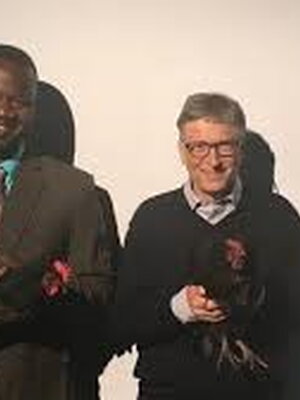
Batamaka Some
University of Illinois at Urbana-Champaign Alumnnus
GRID Minor, 2010
PhD in Anthropology, 2010
Current Position
Regional Representative West Africa Collaborative Crop Research Programme (CCRP) of the McKnight Foundation. Location: Burkina Faso
Please give us an update on your life since graduating from Illinois.
Thank you for the opportunity. Upon completing my doctorate in anthropology in 2010, I worked with non-profit organizations. I first worked at the Bill & Melinda Gates Foundation, within the Market Access team of the Agricultural Development Program. My role was to help hone gender in given projects, as well as to address sociocultural issues that could hinder project objectives. After a year at the foundation, I joined the United Nations' World Food Programme (WFP) in Rome as Gender Advisor, where I led the implementation of the gender strategy of the Purchase for Progress initiative, mostly known as P4P, a pilot initiative that builds on WFP's purchasing power and partners' technical expertise to strengthen smallholder farmers' capacity and integrate them in markets. The P4P pilot, which covered 20 countries in three continents, included 15 countries of Sub-Saharan Africa. It had a specific focus on women’s economic empowerment through creating enabling environments for them for enjoying the financial benefits of agricultural production and markets. I later occupied a position of Senior Regional Gender Advisor for the West and Central Africa Bureau in Dakar, where I led a USAID-funded project (the Sahel Gender Surge) to completion. But I was feeling the burn of distance and separation with family, and the numerous business travels were of no help. I decided to reunite, and rather work as an independent research consultant; which I’ve been doing and enjoying since 2014. I am currently based in Burkina Faso, my home country, where I relocated since 2014. In the process I carried out assignments, studies and assessments mainly focusing gender and agriculture for various organizations, including the Gates Foundation, the International Livestock Research Institute, The United Nations Development Programme, the World Food Programme, and the Dutch Gender Resource Fund. One recently completed research is a study on the impacts smallholder’s traditional chicken farming household incomes and the implication on nutrition in Burkina Faso. I found it gratifying when I was invited to a side event during the 2016 Forbes 400 Summit on philanthropy to share a stage with the Philanthropist Bill Gates – Co-Chair of the Bill & Melinda Gates Foundation – who took further action further the findings of that research. I was also grateful to have been featured in his personal blog in June 2016.
Besides research, I also led trainings in gender mainstreaming in programmes and projects, gave presentations and talks at high-level meeting, and developed gender strategy documents and action plans for implementation. On the social front, I’ve been providing support to community-based organizations to strengthen their capacities in various ways.
I recently accepted the position of Regional Representative, West Africa of the Collaborative Crop Research Programme (CCRP) of the McKnight Foundation. I am very excited about the opportunity, and hope to learn a lot while giving.
What is the focus of your current work and/or subject of your current research?
Since January 2016, I’ve been working on a project on local governance and adaptation to climate change among pastoralists in Southeast Burkina Faso.
How has your GRID minor helped you in your career?
The GRID minor has helped me huge and beyond my expectations and initial motivation that guided me to enrolling in it. Believe it or not, until recently, I have been mostly seen in the profession as a gender specialist, rather than an anthropologist, although my training in anthropology allows to analyze issues at the micro-scale and in a holistic manner that responds to the audience’s expectations. It’s true that I would have felt half-finished, had I got only one aspect of the training I enjoyed here at U of I. Because the research and assignment outputs I produce are a combination of my training in anthropology and gender. And I feel so fortunate I did that minor in GRID along with the strong theoretical and ethnographic training I had through my anthro classes.
Do you have any advice or suggestions for current GRID Students?
Absolutely! Take it more seriously! It has opened a whole and broad career path to me, while I was simply taking the minor for the sake of better understanding issues about gender equality and equity. Today Gender is no longer viewed as a social objective that is integrated solely in philanthropic and humanitarian programmes. It is called for in all sectors of activity that aims to thrive, including the private sector. In this vein, it was remarkable to see the World Bank Group clearly note in its 2012 Report that considering gender is “smart economics” rather than a mere moral issue. So equipping oneself with a good background in GRID pays forward, especially as each student has their own disciplinary training with which they will streamline their GRID acquisition. So, yes, GRID students should definitely go for it! I will also highly recommend that they consider taking some basic training in quantitative analysis prior to entering the job market. I think a 200 level social statistics class or mastery of statistical software can do. The U of I offers so many prospects that they should grab prior to walking out of this haven of training opportunities.
How can we learn more about your work through social media?
http://www.wfp.org/content/p4p%E2%80%99s-women%E2%80%99s-empowerment-pathways-roadblocks-and-successes
https://www.wfp.org/purchase-progress/news/blog/blogwomen%E2%80%99s-ingenuity-determines-p4p%E2%80%99s-success-liberia
https://www.gatesnotes.com/Development/Why-I-Would-Raise-Chickens
http://www.burkina24.com/2016/06/18/batamaka-some-le-poulet-bicyclette-est-une-marque-deposee-du-burkina/
https://www.researchgate.net/profile/Batamaka_Some